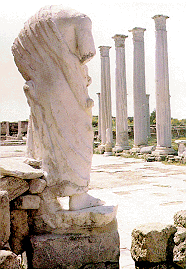| |
 Ancient monuments,
museums, artefacts, a number of ancient buildings, including old
Ottoman and Venetian houses, churches, as well as mosques and
inns are protected and maintained by the Department of
Antiquities and Museums. Under a legislation enacted in 1975,
all persons residing in, or visiting North Cyprus are bound to
register any kind of antiquities in their possession with the
Director of the Antiquities. Such items must not be purchased,
sold, or dealt in except with a special permit from the Department
of Antiquities. The aim of the Turkish Republic of
Northern Cyprus is to preserve and restore not only its own
Turkish-Cypriot heritage but also that of Greek-Cypriot and
other civilisations (past and present) within the context of the
Cypriot art. Ancient monuments,
museums, artefacts, a number of ancient buildings, including old
Ottoman and Venetian houses, churches, as well as mosques and
inns are protected and maintained by the Department of
Antiquities and Museums. Under a legislation enacted in 1975,
all persons residing in, or visiting North Cyprus are bound to
register any kind of antiquities in their possession with the
Director of the Antiquities. Such items must not be purchased,
sold, or dealt in except with a special permit from the Department
of Antiquities. The aim of the Turkish Republic of
Northern Cyprus is to preserve and restore not only its own
Turkish-Cypriot heritage but also that of Greek-Cypriot and
other civilisations (past and present) within the context of the
Cypriot art.
The Department
of Antiquities is striving to preserve and restore all the
ancient monuments throughout the whole of Northern Cyprus.
However, progress has been limited because of inadequate financial resources, shortage of skilled labour, and
Greek-Cypriot embargo which prevents aid-flow to Northern Cyprus
from inter- national organisations such as UNESCO.
 The Department
of Antiquities has branches and guardians in Kyrenia,
Güzelyurt, Salamis,
St.
Hilarion, Bellapais, and
Famagusta. All churches,
abbeys, castles and ancient ruins are strictly controlled and
cared for as as all ancient sites and museums. The illegal
`digging' or `salvaging' of this nation's heritage by any person
or persons, whether on land or in the seas surrounding these
coasts, is viewed with extreme seriousness by the authorities.
In addition to the ancient city of Salamis, many other
historical sites have received attention in recent years. The
celebrated ruins at Soli and the
Vouni Palace in
Güzelyurt area
have been partially restored. Work at these sites are still
continuing. The Royal tombs and the Engomi
ruins are now open to
the public; both are close to the historic ruins of the great
ancient city of Salamis, some six kilometres from Famagusta. The Department
of Antiquities has branches and guardians in Kyrenia,
Güzelyurt, Salamis,
St.
Hilarion, Bellapais, and
Famagusta. All churches,
abbeys, castles and ancient ruins are strictly controlled and
cared for as as all ancient sites and museums. The illegal
`digging' or `salvaging' of this nation's heritage by any person
or persons, whether on land or in the seas surrounding these
coasts, is viewed with extreme seriousness by the authorities.
In addition to the ancient city of Salamis, many other
historical sites have received attention in recent years. The
celebrated ruins at Soli and the
Vouni Palace in
Güzelyurt area
have been partially restored. Work at these sites are still
continuing. The Royal tombs and the Engomi
ruins are now open to
the public; both are close to the historic ruins of the great
ancient city of Salamis, some six kilometres from Famagusta.
|









